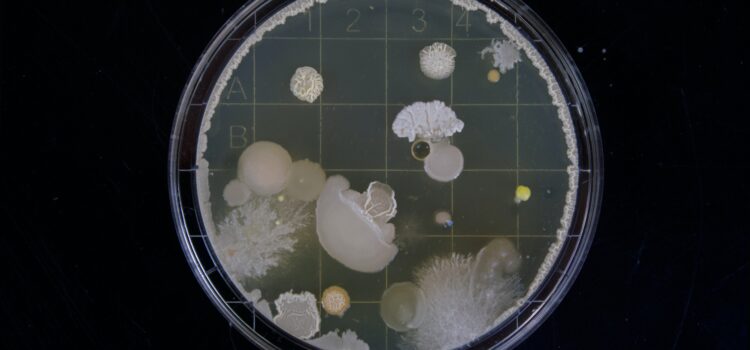

This article is an excerpt from the Shortform book guide to "Gut" by Giulia Enders. Shortform has the world's best summaries and analyses of books you should be reading.
Like this article? Sign up for a free trial here .
What is the human gut microbiome? How does it influence our physical and mental health?
We have huge populations of bacteria in the human gut microbiome. These bacteria play a vital role in digestion, and emerging science suggests that they also have other important effects. These include strengthening our immune system and possibly impacting our mental health.
Keep reading to learn about the role of these bacteria populations, how we develop them, and how we can maintain a healthy gut.
The Role of Bacteria in the Gut
Our bodies are filled with and covered in microbes—tiny organisms that can only be seen through a microscope. Enders claims that 90% of the cells in our bodies are microbes. Taken together, these microscopic organisms form what scientists call your human gut microbiome, an ecosystem of particles operating inside your body.
Almost all of the bacteria in your microbiome live in your gut. Enders puts the number at 99%, with more than 1,000 different species present. While scientists are still discovering everything they do, it’s clear that these bacteria serve several important functions, including keeping us healthy and providing us with nutrients.
(Shortform note: New evidence has called into question some of the numbers that Enders uses in this section. A recent study suggests that microbes constitute just 57% of our cells, not 90% as Enders claims. Furthermore, other estimates suggest that there are 300 to 500 different species of bacteria in the gut, not 1,000.)
Let’s take a closer look at these functions of our gut bacteria:
- Training the immune system: According to Enders, the human gut microbiome trains your immune system, helping you to fight off infections, viruses, and bad bacteria. She explains that your gut holds microbes in the mucus membrane, an area that prevents them from being absorbed through the gut wall. This ensures that bad bacteria won’t impact other parts of the body and cause sickness.
- Digesting food and producing nutrients: Your bacteria make your gut more efficient by breaking down foods that your body can’t process alone. Enders explains that sometimes your gut lacks the enzymes to digest a particularly complex substance, such as lactose or plant starches. Your gut bacteria can produce these enzymes to help you break down and absorb the food. In this way, according to Enders, your microbes provide you with about 10% of your nutrition.
Can Bacteria Influence Mental Health?
While humans’ gut microbiome helps us stay healthy and get the nutrients we need, recent evidence suggests that the bacteria can have negative effects as well. Enders explains that one of the emerging fields of research in gastroenterology (the study of the gut) is the connection between the gut and the brain. Some scientists believe that the composition of our gut bacteria can impact our susceptibility to stress, anxiety, and even depression.
While she acknowledges that more research needs to be done on the brain-gut connection, Enders cites several studies that offer support to this theory. Let’s explore these studies on humans and their conclusions.
Studies on Humans
While most of our knowledge of the gut-brain connection comes from research on animals, Enders does cite several studies with human participants. One study found that the presence of the bacteria Bifidobacterium bifidum slightly reduced anxiety before a test, but only in subjects who did not sleep well. Another study found that participants who took probiotics—a supplement of helpful bacteria—for three to four weeks saw a slight increase in mood. However, a third study, conducted in 2017, found that sustained probiotic use had no effect on depressive symptoms. Overall, Enders maintains that these individual studies are inconclusive and that more research is required.
Developing and Maintaining Your Gut Microbiome
The human gut microbiomes are crucial to our health in multiple ways. But how do we get these helpful bacteria in our gut?
Microbiome Development
According to Enders, humans begin to develop the gut microbiome within seconds of being born. Enders claims that under normal circumstances, the womb is germ-free. This means that we first come into contact with bacteria when we enter the birth canal. These bacteria begin to train our immune system and help us digest food.
(Shortform note: Recent studies challenge Enders’s claim that the womb is usually free from bacteria. Some scientists theorize that the mother passes bacteria to the fetus through the bloodstream, citing studies that have found bacteria in the placenta. However, other scientists question the methods of these studies and maintain that more research must be done.)
As we continue to grow, our microbiomes change based on our surroundings. Enders notes that babies put many items that they find in their environments in their mouths, which exposes them to all sorts of new bacteria. While this increases the risk of illness, it also helps develop immunity and create a healthy microbiome.
While our environment influences our microbiomes, Enders also suggests that family members can pass gut bacteria down from one generation to the next. (Shortform note: Because she claims that the womb is germ-free, Enders presumably means that family members pass down bacteria through contact, not through genetics.)

———End of Preview———
Like what you just read? Read the rest of the world's best book summary and analysis of Giulia Enders's "Gut" at Shortform .
Here's what you'll find in our full Gut summary :
- How your digestive system works and why it’s important to keep it healthy
- How tiny organisms in your intestines influence your immune system (and possibly your mood)
- What your appendix actually does






